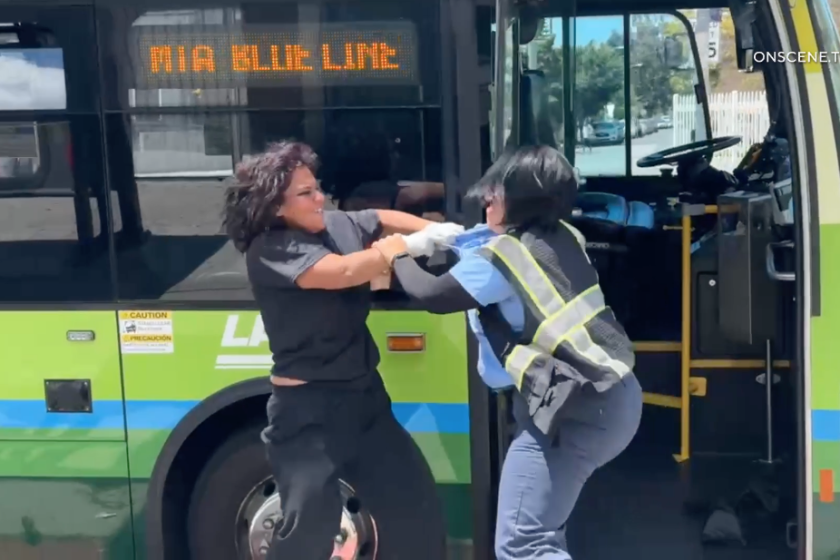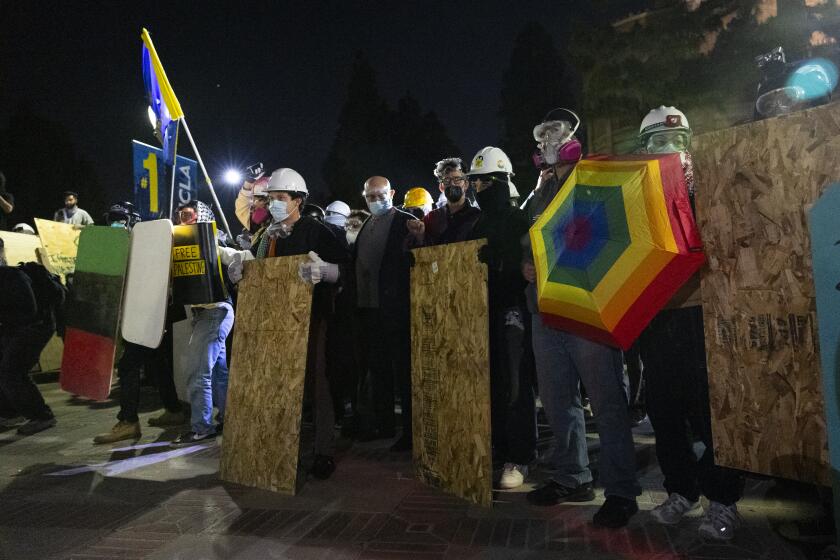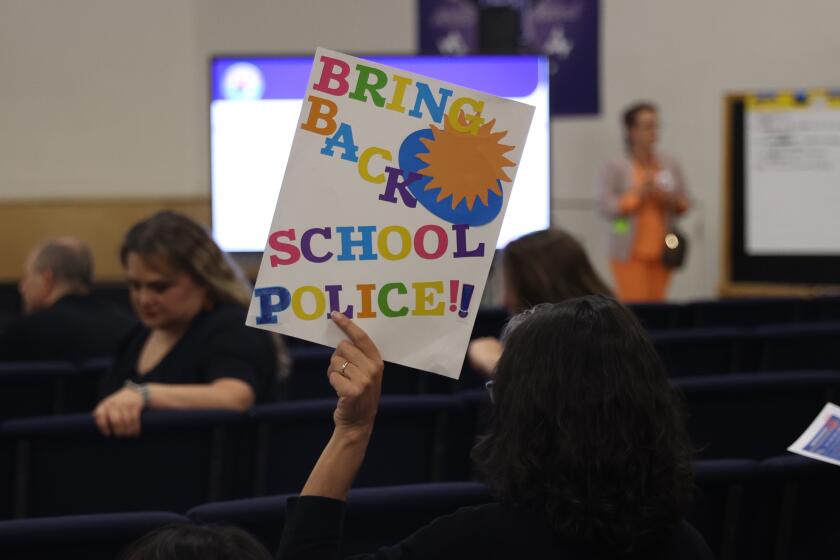Media Coverage of the King Case: Guilty or Innocent?
The subject is the Rodney G. King case.
Have the media been as villainous in this raging controversy as the police who directly or indirectly participated in the ferocious beating of King as he lay helpless on the ground?
You got that feeling from listening to many callers to KGIL-AM (1260) last week.
Talk radio has been firing up the King case for more than a month, affirming its role as the nation’s debate club of the airwaves. But KGIL left other Los Angeles talk-radio stations in the dust when it altered its regular format for 10 hours on Thursday and invited calls only from police officers and their families regarding fallout from the volatile King case.
Then on Friday, the station took only calls responding to Thursday’s calls.
Caller after caller on Thursday, and many others on Friday’s equally heavy phone-in day, said police officers felt underappreciated by the public. And when their targets were not Mayor Tom Bradley or the Los Angeles Police Commission--which caused an uproar Thursday by putting embattled Police Chief Daryl F. Gates on a 60-day paid leave--their targets were the media.
Let’s examine these charges against the media:
* TV overdid it by relentlessly replaying amateur cameraman George Holliday’s infamous video showing police walloping a helpless King.
As this argument goes, repeatedly replaying the video reinforced an impression that all Los Angeles police officers are racist, sadistic brutes.
As for the charge against TV, amen.
Given its reliance on action pictures, you could have just bet that TV would make the Holliday tape part of its newscast furniture, that even weeks after the event, every King-related story would be wallpapered with pictures of that savage beating as a sort of macabre decoration. Fortunately, most of that has now stopped.
* TV has helped whip up an anti-Gates frenzy.
True again, at least to some extent.
The constant tape replays surely contributed to that, as did knee-jerk overcoverage of some of Gates’ critics without putting in context their personal agendas or the sizes of their constituencies. If there was any good reason for granting air time to that traveling demagogue, the Rev. Al Sharpton, for example, none comes to mind.
Plus, there was that infamous interview of Bradley by KCBS Channel 2 anchors Bree Walker and Michael Tuck in which Bradley was virtually pressured by them to pressure Gates. As a prime player in this controversy, Bradley should get tough questions. But Walker in particular went much further, at one point even injecting herself into the interview by citing her own “black friends” in seeking to rebut a statement by the mayor. Oh, give us a break.
* The media have made a hero out of King, a parolee who was beaten, police say, after he had led them on a car chase.
Wrong.
The police officers who clobbered King as he lay on the ground and others who appeared to support that act are the ones who made him seem a hero.
* By giving more coverage to the King beating than to police casualties, the media reveal an anti-police bias.
Wrong again.
First, violence against police does get prominent coverage. Second, although it’s certainly true that the King case has gotten even much greater coverage, there’s good reason for that.
A cliche applies here: When dog bites man, it’s not news. When man bites dog, it is news.
Although the result is no less painful or tragic, violence by criminals against police is dog biting man. We expect this of criminals precisely because they are criminals.
Police beating King is man biting dog. It’s a case of the good guys--the ones sworn to protect the public and whose integrity is crucial to civilized society--becoming the bad guys.
On KGIL, however, the media were the bad guys as well.
The station’s cop-a-thon filled the call-in shows of John Swaney and Carole Hemingway. Some of the calls were repetitive, and surely many also reflected an organized campaign to show support for Gates.
Yet this was not only a brilliant programming move by new KGIL general manager Tom Mosher, but also a vibrant reminder that talk radio is one of the very few areas of broadcasting where raw debate is encouraged and the media don’t necessarily get the last word.
“When I woke up the other morning,” Mosher recalled, “I said, ‘What happens if we don’t get the calls?’ ” Not to worry.
“The response was extraordinary,” said Hemingway, who has been an outspoken critic of Gates on her afternoon show, but who Thursday gracefully played the role of passive listener. The phone-in crush was so great that KGIL extended Hemingway’s show two hours past its usual 4 p.m. sign off. “There wasn’t a breath between when someone would hang up and another call would come in,” she said.
For the first time, Hemingway added, she got a sense of police as an extended family. “The callers felt police were being hurt and that (Gates), the head of their family, was supporting them,” she said.
Besides buying a newspaper ad, KGIL had help from the Police Protective League, which notified its members of the station’s plans and gave them a code that would identify them as police when they called KGIL. So in a sense, the airwaves were being primed for a pro-Gates point of view.
Thus with very few exceptions the callers did support Gates and criticized Bradley, who has urged Gates to step down, and the Police Commission, whose suspension was overturned, in effect, in a vote Friday by the City Council.
Meanwhile, the medium that has helped incite anti-Gates fervor is just as capable of helping incite pro-Gates fervor.
Gates forces scored big on TV Friday not only with news of his probable reinstatement, but also with a media event at which cameras were suckered into shooting a shrewdly orchestrated joint appearance by the chief--now assuming the role of a folksy good ol’ boy--and Holliday, the quiet-spoken man whose ugly footage brought on all the controversy.
Yes, it was a good day for the chief. Even though memories of the King video lingered, Gates now had a video of his own, as the war of images and public relations accelerated on the airwaves.
More to Read
Start your day right
Sign up for Essential California for news, features and recommendations from the L.A. Times and beyond in your inbox six days a week.
You may occasionally receive promotional content from the Los Angeles Times.






